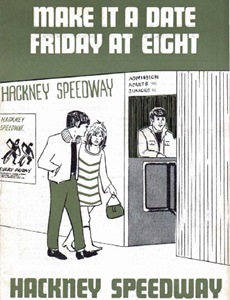
| Home | Contact Us | Articles |
| Books - DVDs | Stadia Pix | Programme Generator |
Rose Tinted Spectacles
By Steve Haire

A great series of article by Tracy Holmes comparing Ivan Mauger to the best of the 'English' riders. I think we all look back with rose tinted spectacles and think things seemed better back in our youth.
In '68 as a teenager I remember the excitement of rolling up "to make it a date, Friday at eight" at Hackney Speedway and seeing the best riders in the world competing in a first division league of 19 teams supported by a second division of 14 teams. There was no doubling up or down, (very little guesting, usually rider replacement with a registered number eight) for top three and a junior replacing the other four team members.
The second division was a league for up and coming riders normally headed by an experienced senior rider at the end of his riding days. There wasn't any automatic promotion and relegation so the second division's teams top riders became a 'parent' club's (promoters were allowed to run more than one team/track) first divisions number 8 and would normally only ride in place of an injured rider.
As with other sports Speedway riders were contracted to a promotion or club. Team strengths were restricted by a maximum team average so promoters/clubs would sign riders to contract and then either loan them out for a fee or sell their contracts.
An amusing anecdote about transfers is at that time Gordon Kennett became the most expensive rider signed for £1500, 'Uncle' Len Silver promoter of Hackney then signed Gordon's brother Barney Kennet from Canterbury for £1500 and a penny. Hackney had also signed Dave Kennett, but unfortunately for them Gordon Kennett, the oldest of the three brothers went on to be the most successful, heading the averages at Eastbourne, Oxford and White City and achieving world number two status to Ole Olsen in the 1978 world final.
Most seasons started with friendly local derby's but Hackney would usually start with a league match so 'Uncle' Len could say "look folks' we're top of the league". At that time each team had at least 2 world class riders, Hackney's being Colin Pratt and Bengt Jansson (world number two to Ove Fundin in 1967) which highlighted the fact that Britain (which included commonwealth riders) and Sweden were the dominant nations.
It wasn't until the seventies when Britain started having a surplus of world class English riders that Great Britain dropped the commonwealth riders of the likes of Jim Airey, John Boulger, Ivan Mauger, Barry Briggs and Ronnie Moore and became titled as England and later as Team GB.
With Tracy's question as to whether riders would sooner be World Champion or win the league the answers give a hint as to what it takes to become a champion. Another telling sign was when most riders were interviewed they would answer by saying "I just come here to get enough points to qualify for the next round", those who went on to become World Champions went out to win the qualifying rounds.
England has had a wealth of riders who have dominated in the league but have failed to translate that success on the individual World Championship stage. Perhaps one the best examples of that is Eric Boocock, won numerous individual meetings and international caps and for a decade averaged over 10 points a match in the league, something not even Ivan Mauger achieved, yet even with his totally professional outlook (would recommend his book 'Around in Circles') he never managed to translate that into the World Championship success.
As one gets older it does become more difficult to get passionate about things you like. When you consider the state of British Speedway today it isn't a case of viewing things through rose tinted spectacles, it was better in my day.
Even televised speedway was better back in the day, with freeview television, on Quest the GP highlights has been reduced from an hour to half an hour. Speedway is still a great sport and I hope it has a revival, but it was better back in my day.
This article was first published on 21st July 2024

"Steve Haire's article "Rose tinted spectacles" was both amusing and informative, and bought back some happy memories of Friday nights at the "Wick".
Although West Ham was my primary team, the end of the school, then working, week couldn't come quick enough with a trip on an old coach, literally falling to bits, from Stratford Broadway to the stadium. Free at first, then Len decided to monetise it by charging 6d (2-1/2p for those under 60). "Uncle" Len was one of the best showmen in the game, and a shrewd promoter.
One thing I think Steve may have got slightly wrong is the reference to Len saying "we are top of the league" if they won their opener - in fact it was usually with Wolverhampton, who were then a fellow Friday night track and that was the reason we opened with a league encounter.
Sadly the glorious 60's and 70's are now long gone and just a fading memory, but memories are something that can never be taken away, and they are all happy ones. I'm still as besotted by the sport as I always was, but Steve is right - it was better in our day. Fings just ain't what they used to be."